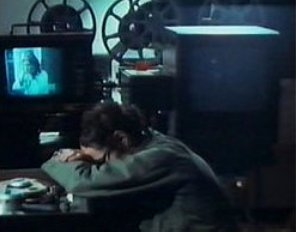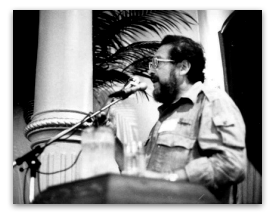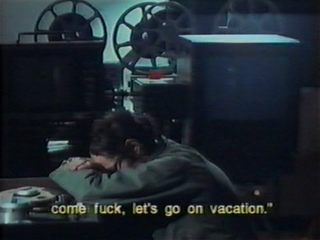It’s depressing to recall that Karl Hess: Toward Liberty (1979) wound up winning an Oscar, but this was of course on the eve of Ronald Reagan’s first landslide election as Big Daddy/Rich Uncle. This polemic appeared in the October 8, 1980 issue of The Soho News, and might be considered one of the first glimmers of a more extended argument that would eventually yield the book Movie Wars: How Hollywood and the Media Limit What Films We Can See two decades later. I’ve often speculated, incidentally, if my final sentence might have had anything to do with my never having been invited to the Telluride Film Festival — the current codirector of which, Tom Luddy, was working for Coppola at the time. (I can still recall an angry phone call from Tom during this period that insisted I was dead wrong in taking Coppola as part of the problem rather than as part of the solution. Much later, I should add, in 1987, Tom himself produced one of Godard’s most underrated and neglected features, King Lear.) –J.R.
Hollywood or Bust
by Jonathan Rosenbaum
What do you want to know about the Seventh Annual Student Film Awards — presented by the Academy of Motion Picture Arts and Sciences and AT&T — that a critic could possibly tell you? All I know is the invitation admitted me to a reception in the Museum of Modern Art’s garden and a subsequent screening of an 80-minute feature. I received a press kit containing, among other things, messages from Academy president Fay Kanin and Bell System vice-president Ed Block, proclamations by Mayor Koch and Governor Carey, and a 7×10 glossy of the eight student winners (seven men, one woman) standing beside an enormous Oscar.
The screening was preceded by a few more messages, proclamations, and photographs taken for future 7X10 glossies. A brother of Mayor Koch was asked to stand up and be applauded, though he wisely managed to sneak out just in time before the movie started — a compilation of punchy Muzak, more official introductions, PR flack involving the five main winners (all male) “rapping” with various Academy figureheads, and four talented, well-made, and essentially unexciting films.
This feature, I should add, is being being sent free of charge by AT&T to literally hundreds of colleges, universities, and non-profit organizations nationwide. I wish the sponsors and award winners well with it but can’t help feeling somewhat depressed about the whole business. Blandness is not a quality I would assign to any of the four films on its own terms; but it is a context that the remainder of the film virtually insists upon and imposes on the student films and filmmakers alike, through the relentless self-ingratiation of the whole enterprise.
I certainly can’t quarrel with the claim that the winning films are all exceptionally well crafted. But I can protest the implicit assumption that craft (whether “good” or “bad”) is an issue untouched by ideology. The four categories of achievement awards — dramatic, documentary, experimental, and animation — suggest this bias insofar as they imply all sorts of predigested notions and divisions. (Why, for instance, are they assumed to be mutually exclusive?)
Candy Store, winner of the dramatic achievement award — directed by Claude Kerven for NYU, memorably written and acted by James Russo — gives us that prizewinning favorite, “a mildly retarded young man” (to quote the blurb). We meet a character “who, upon finding his innocent world threatened when his older brother becomes involved with local underworld figures, devises a chilling solution to save his brother and himself.” This solution consists of taking his brother’s gun and blasting both of the thugs with it — a heroic act, in the film’s terms, that doesn’t alter the older brother’s condescension, as the final scene demonstrates.
Although stylistically unadventurous, Candy Store is a sensitive foray into Scorseseland. I’m sure that any links between its violent resolution and the close relationship of Karl Hess — the subject of Roland Halle and Peter Ladue’s winning documentary from Boston University, Karl Hess: Toward Liberty — with the American Rifle Association must be fortuitous.
Yet the pairing of these films with an “experimental” winner (Sean Phillips’ Sections, University of Southern California) offering ugly sound, ugly image, and nice technology — a swinging threesome that would fit snugly behind the credits of any James Bond flick — leads me to take the selection as a whole as something of a Reagan package, in effect if not in intent. (I can’t really object to John Lasseter’s Nitemare, the animated winner from the California Institute of the Arts, about the beasties conjured up at night by a little boy in bed — though I can’t imagine that Reagan could, either.)
The documentary, in particular, can scarcely be written off as ideologically impartial. A hagiographical profile of Barry Goldwater’s principal speechwriter (“my Shakespeare”) during the ’64 presidential campaign — also his ghostwriter, a cofounder of National Review, commercial welder, and one-time SDS member — Karl Hess: Toward Liberty (sic) is unabashed propaganda for right-wing anarchism, masquerading, as it always does in America, under the gentle rubric of Just Plain Folks.
The final irony of Hess’s laid-back words about people becoming “merely the players in someone else’s scenario” and the evils of big government and big organizations is that these messages are delivered courtesy of the Academy and AT&T’s Bell System. They’re being delivered, moreover, in a feature whose overall purpose appears to be to shove the film industry down everyone’s throat as gracefully as possible in order to convince students that no other motive or outlet for filmmaking can possibly exist, even in the mind. All roads lead to Hollywood, and the buck stops here.
Since I take it as a given that one of the unacknowledged but unavoidable aims of the Academy’s student (and non-student) awards is to grind any potential Godards into the carpet before they can get too feisty, you can be sure that none of this year’s winners can be mistaken for a future Godard. Turn to New York‘s recent interview with Godard and you’ll find the same creepy, solipsistic assumptions propounded, even more directly.
“It’s possible that Godard was not even surprised,” Dan Yakir informs us after Jean-Paul Belmondo recently asked him, “Can you still direct?” After all, we’re told that until Godard recently signed up with Coppola, he “had become a cultural nonperson” — despite a decade of important work that New York (and New York) are too short-sighted to be interested in.
Poor old James Joyce — condemned to be a cultural non-person half a century ago, slaving away at Finnegans Wake when today he could have signed up as a feature writer for Reader’s Digest or TV Guide and thus have gotten at least one foot in the door, leading to the possibility of…who knows? A Book of the Month Club selection, a movie sale to Coppola or Lucas, a spot on Phil Donohue? Fellow commiseraters in this unhappy turn of events are invited to take joy in the Seventh Annual Student Film Awards, every prize a winner. Maybe if Godard sticks with Coppola, plays by the rules, and minds his manners, he might turn out to be half as lucky or as good.
— The Soho News, October 8, 1980



